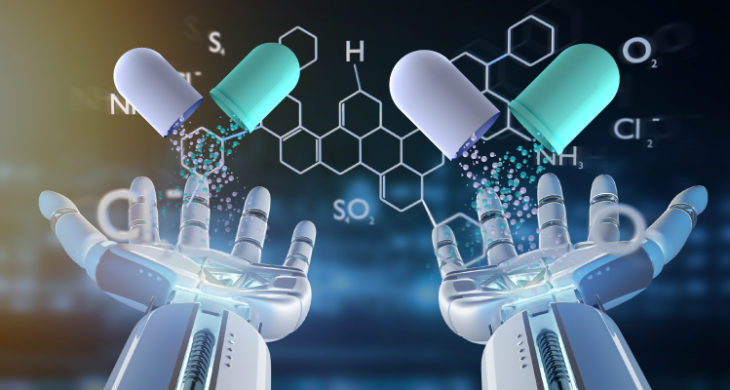In the rapidly evolving landscape of healthcare, artificial intelligence (AI) has emerged as a revolutionary force, particularly in the realm of drug discovery and development. The traditional methods of discovering new drugs are often cumbersome, resource-intensive, and plagued by high failure rates. However, AI is transforming these processes, making them more efficient, cost-effective, and successful. This comprehensive exploration will cover the multifaceted roles that AI plays in drug discovery, the associated benefits and challenges, and the future potential of this technology in shaping the pharmaceutical industry.
Understanding Drug Discovery and Development
The Traditional Process
Drug discovery and development typically involves several complex stages:
- Target Identification: The first step in drug discovery is identifying a biological target, often a protein or gene associated with a disease. Researchers study disease pathways to pinpoint these targets.
- Lead Compound Identification: Once a target is identified, researchers screen thousands of compounds to find potential “lead” candidates that can interact effectively with the target.
- Preclinical Testing: Selected compounds undergo extensive laboratory testing and animal studies to evaluate their safety and efficacy before they can be tested in humans.
- Clinical Trials: Successful candidates move on to clinical trials, which are conducted in three phases (Phase I, II, and III) to assess safety, efficacy, and optimal dosing. Each phase involves a progressively larger group of participants.
- Regulatory Approval: Following successful clinical trials, researchers submit data to regulatory authorities (such as the U.S. Food and Drug Administration) for review and approval.
- Post-Marketing Surveillance: After a drug is approved and on the market, ongoing monitoring ensures its safety and effectiveness in the general population.
This intricate process can take over a decade and cost more than $2.6 billion, with only about 10% of drug candidates making it to market.
Challenges in Drug Discovery
The traditional drug discovery process is fraught with challenges:
- High Attrition Rates: Approximately 90% of drug candidates fail due to safety, efficacy, or other concerns, leading to significant resource waste.
- Cost and Time: The extended timelines and high costs associated with drug development can deter investment and slow the introduction of new therapies.
- Data Overload: The increasing volume of biological, chemical, and clinical data makes it difficult for researchers to extract actionable insights using traditional analytical methods.
The Emergence of AI
The integration of AI into drug discovery addresses these challenges head-on, offering innovative solutions to streamline processes, improve efficiency, and ultimately reduce the time and cost associated with bringing new drugs to market.
The Applications of Artificial Intelligence in Drug Discovery
AI is making waves in several key areas of drug discovery and development:
1. Data Mining and Analysis
One of the most significant applications of AI in drug discovery is its ability to mine and analyze vast amounts of data quickly and efficiently.
Natural Language Processing (NLP)
Natural Language Processing (NLP) techniques allow AI systems to read and understand scientific literature, clinical trial reports, and medical records. This capability enables researchers to extract relevant information regarding potential drug targets, existing therapies, and treatment outcomes. For instance, AI algorithms can scan thousands of papers to identify new connections between diseases and existing drugs, potentially revealing new avenues for research.
Predictive Modeling
Machine learning models can be trained on historical data from previous drug development projects to predict the success of new drug candidates. These models analyze various factors, including molecular structure, biological activity, and chemical properties, to provide insights into which compounds are more likely to succeed in later stages of development.
2. Virtual Screening
AI facilitates virtual screening, a computational method used to evaluate how well potential drug candidates bind to specific biological targets. This approach significantly accelerates the lead identification process.
Molecular Docking
Molecular docking simulations allow researchers to visualize the interaction between a drug candidate and its target at an atomic level. AI algorithms can predict binding affinities and optimize molecular structures to improve efficacy and selectivity.
Compound Library Optimization
AI can assist in generating and optimizing compound libraries, focusing on the most promising candidates based on predicted interactions. This targeted approach reduces the number of compounds that need to be tested in the lab, expediting the lead selection process.
3. Drug Repurposing
AI is increasingly being utilized for drug repurposing, which involves identifying new uses for existing drugs. This approach can save significant time and resources compared to developing new compounds from scratch.
Leveraging Existing Data
AI can analyze existing databases of approved drugs, clinical trial data, and disease profiles to identify potential new uses for these drugs. By examining the molecular and biological mechanisms of existing medications, AI can reveal unexpected therapeutic applications, thereby speeding up the drug development process.
4. Biomarker Discovery
Biomarkers play a crucial role in understanding disease mechanisms and developing targeted therapies. AI can assist in identifying and validating biomarkers that predict disease progression or response to treatment.
Genomic Data Analysis
AI can analyze complex genomic, proteomic, and metabolomic data to identify potential biomarkers for specific diseases. This capability enables researchers to develop targeted therapies tailored to individual patient profiles, enhancing treatment efficacy.
5. Clinical Trial Optimization
AI can enhance the efficiency and effectiveness of clinical trials, which are critical for evaluating the safety and efficacy of new drugs.
Patient Recruitment
AI algorithms can analyze electronic health records (EHRs) to identify potential candidates for clinical trials, matching patients with specific eligibility criteria more efficiently. This targeted recruitment approach can expedite the enrollment process, leading to faster trial completion.
Real-Time Monitoring
During clinical trials, AI can facilitate real-time data monitoring, enabling researchers to identify potential safety concerns or efficacy signals early on. This proactive approach allows for timely adjustments to trial protocols, improving overall outcomes.
Predictive Analytics
AI can analyze trial data to predict outcomes and identify factors that influence treatment response. By leveraging historical data, researchers can make informed decisions about trial design, dosing, and patient stratification.
6. Precision Medicine
AI technologies enable the development of precision medicine approaches, which tailor treatments to individual patients based on their unique genetic, environmental, and lifestyle factors.
Personalizing Treatment
By analyzing patient data, including genetic information and treatment history, AI can help identify the most effective therapies for specific patient populations. This personalized approach enhances treatment efficacy and minimizes the risk of adverse effects.
Genetic Profiling
AI can assist in the analysis of genetic profiles to identify biomarkers associated with drug response. This information allows researchers to develop targeted therapies that are more likely to be effective for specific patient subgroups.
Benefits of AI in Drug Discovery and Development
1. Increased Efficiency
AI technologies can streamline various aspects of drug discovery, significantly reducing the time and resources required to develop new therapies. By automating data analysis, virtual screening, and patient recruitment, AI allows researchers to focus on high-potential candidates and optimize workflows.
2. Cost Reduction
By minimizing the time and resources spent on unsuccessful candidates, AI can help lower the overall cost of drug development. The ability to repurpose existing drugs and identify potential biomarkers further contributes to cost savings.
3. Improved Success Rates
AI can enhance the probability of success in drug discovery by guiding researchers toward the most promising candidates. Predictive modeling, biomarker identification, and personalized medicine approaches can improve treatment efficacy and patient outcomes.
4. Enhanced Collaboration
The use of AI can facilitate collaboration among researchers, pharmaceutical companies, and healthcare providers. By enabling data sharing and providing insights across disciplines, AI fosters a more integrated approach to drug development and patient care.
5. Personalized Medicine
AI technologies enable the development of personalized therapies tailored to individual patient profiles. By identifying biomarkers and predicting treatment responses, AI allows for targeted interventions that improve patient outcomes.
Challenges and Limitations of AI in Drug Discovery
Despite its potential, the integration of AI into drug discovery and development is not without challenges:
1. Data Quality and Accessibility
The effectiveness of AI algorithms relies heavily on the quality and accessibility of data. Inconsistent or incomplete data can lead to inaccurate predictions and hinder the overall effectiveness of AI applications. Ensuring that datasets are standardized and comprehensive is crucial for the success of AI in drug discovery.
2. Regulatory Concerns
The use of AI in drug development raises regulatory questions regarding data privacy, algorithm transparency, and validation of AI-generated predictions. Regulatory agencies must adapt to ensure that AI technologies are evaluated appropriately without stifling innovation.
3. Interpretability of AI Models
Many AI algorithms, particularly deep learning models, operate as “black boxes,” making it challenging to interpret their decision-making processes. This lack of transparency can hinder acceptance among researchers, regulators, and clinicians, as understanding the rationale behind predictions is crucial for building trust in AI systems.
4. Integration with Existing Systems
Integrating AI technologies into existing workflows and systems can pose logistical challenges. Pharmaceutical companies must invest in training, infrastructure, and change management to ensure successful implementation. Overcoming resistance to change and fostering a culture of innovation are essential for leveraging AI effectively.
5. Ethical Considerations
As AI becomes more integrated into drug discovery, ethical considerations surrounding data use, algorithm bias, and patient privacy must be addressed. Ensuring equitable access to AI-driven therapies and safeguarding patient information is vital for maintaining public trust in these technologies.
The Future of AI in Drug Discovery and Development
As AI continues to evolve, its impact on drug discovery and development is expected to grow. Several trends and advancements may shape the future of this field:
1. Enhanced Machine Learning Algorithms
Advancements in machine learning algorithms will likely lead to more accurate predictions and improved data analysis capabilities. Techniques such as reinforcement learning, generative models, and deep learning will further enhance drug discovery processes by enabling more sophisticated analyses of complex datasets.
2. Greater Collaboration
Increased collaboration between academia, industry, and regulatory bodies will be essential for harnessing the full potential of AI in drug discovery. Public-private partnerships and interdisciplinary collaborations will facilitate knowledge sharing and accelerate the translation of AI research into practical applications.
3. Integration of Multi-Omics Data
The integration of multi-omics data (genomics, proteomics, metabolomics) with AI will enhance our understanding of disease mechanisms and improve drug discovery efforts. By leveraging diverse data types, researchers can gain deeper insights into drug targets and treatment responses.
4. Personalized Medicine Advancements
AI will play a critical role in advancing personalized medicine approaches, enabling the development of tailored therapies that consider individual patient characteristics. The ability to analyze vast datasets will facilitate the identification of biomarkers and improve treatment efficacy for diverse patient populations.
5. Regulatory Adaptation
As AI technologies continue to evolve, regulatory agencies will need to adapt their frameworks to accommodate these innovations. Establishing clear guidelines for the use of AI in drug discovery will be essential to ensure safety, efficacy, and ethical considerations are met.
6. Continued Investment in AI Research
Investment in AI research and development will likely accelerate, with both public and private sectors recognizing the potential benefits of AI in drug discovery. This influx of funding will support innovation and facilitate the development of new AI-driven tools and technologies.
Conclusion
The role of artificial intelligence in drug discovery and development is transformative, addressing long-standing challenges and offering new opportunities for innovation. By streamlining processes, enhancing predictive capabilities, and facilitating personalized medicine approaches, AI is set to revolutionize the pharmaceutical landscape. As researchers continue to explore the potential of AI, the future of drug discovery looks promising, with the prospect of delivering safe, effective therapies to patients more efficiently than ever before. Embracing these advancements will require collaboration, investment, and a commitment to ethical practices, ultimately paving the way for a healthier future.

